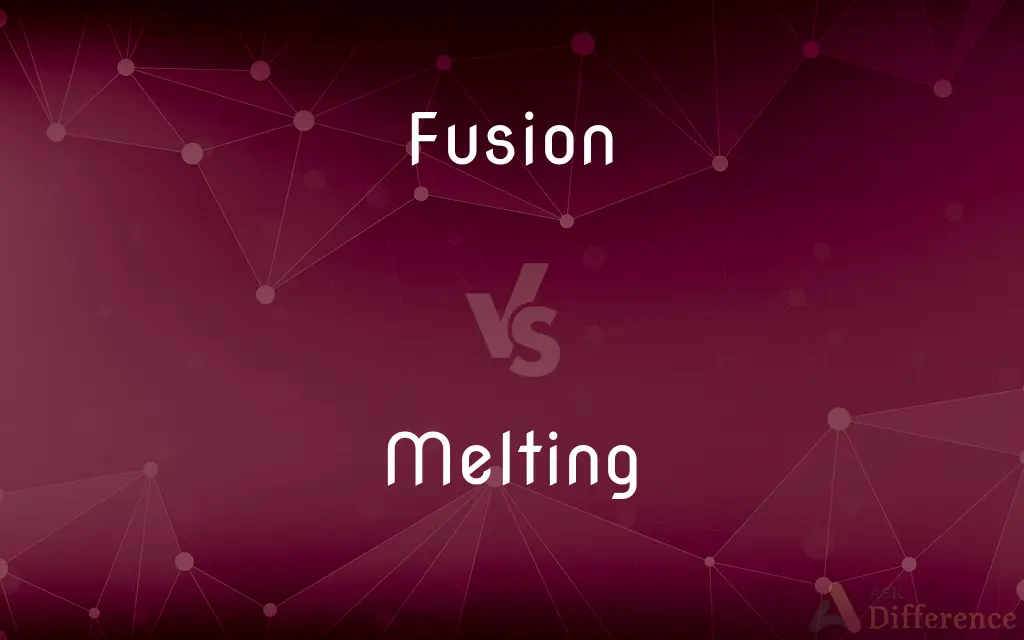Fusion vs. Melting — What's the Difference?
By Urooj Arif & Maham Liaqat — Updated on March 26, 2024
Fusion is the process of combining two or more entities into a single one, often referring to nuclear reactions or the phase transition from solid to liquid. Melting is specifically the phase transition of a substance from solid to liquid.

Difference Between Fusion and Melting
Table of Contents
ADVERTISEMENT
Key Differences
Fusion can describe a physical process where heat causes a substance to transition from solid to liquid, also known as melting, highlighting the specific phase change. However, fusion is more broadly applied in contexts like nuclear fusion, where atomic nuclei combine at extremely high temperatures to form a heavier nucleus, releasing energy. Melting, on the other hand, strictly refers to the phase change of a material when it absorbs sufficient heat to break the bonds between its molecules, transitioning from a solid state to a liquid one without changing its chemical composition.
In scientific terms, the melting point is a specific temperature at which a solid becomes a liquid, a characteristic intrinsic to each material. Fusion, when used in the sense of melting, shares this concept, but in nuclear physics, fusion refers to conditions and reactions that occur at temperatures and pressures millions of times higher than those at which materials melt.
Technologically, fusion is pursued as a clean and virtually limitless source of energy, given its basis in nuclear reactions similar to those powering the sun. Melting plays a crucial role in various industries, such as metallurgy and manufacturing, where the melting and casting of metals are fundamental processes.
Culturally, fusion can imply the blending of diverse elements, such as in fusion cuisine, where ingredients from different culinary traditions are combined. Melting, while less frequently used metaphorically, might refer to the softening or dissolution of barriers or differences.
Environmental considerations also distinguish the two: nuclear fusion, once achieved efficiently, could significantly reduce reliance on fossil fuels and minimize environmental impact. The melting of substances, while a natural and industrial process, has environmental implications, particularly in the context of global warming and the melting of polar ice caps.
ADVERTISEMENT
Comparison Chart
Definition
Combining two or more entities into one; phase change from solid to liquid.
Phase change from solid to liquid due to temperature increase.
Contexts
Nuclear reactions, culinary arts, music.
Physical and chemical processes, industrial applications.
Key Process
Nuclear nuclei combining or solid to liquid transition.
Solid absorbing heat to become liquid.
Applications
Energy production, culinary innovation.
Metallurgy, manufacturing, cooking.
Environmental Impact
Potential for clean energy; minimal direct environmental impact.
Industrial emissions; relevance to global warming.
Technological Significance
Pursued for energy solutions; complex to achieve.
Fundamental in various industries; technologically simpler.
Cultural Implication
Blending of diverse elements.
Softening or dissolution of barriers.
Compare with Definitions
Fusion
In physics, the process where two atomic nuclei join to form a heavier nucleus.
Nuclear fusion releases energy by combining hydrogen atoms into helium.
Melting
Environmental concern related to climate change.
The melting of polar ice caps is accelerating.
Fusion
Transition from solid to liquid in materials.
The fusion point of ice is 0°C.
Melting
The process of a solid becoming a liquid through heat.
Melting ice transforms into water as it warms.
Fusion
A blending of musical styles.
Jazz fusion incorporates elements from rock and funk.
Melting
A phase transition specific to temperature increase.
The melting point of iron is about 1538°C.
Fusion
Conceptual or creative blending.
His artwork is a fusion of traditional and modern techniques.
Melting
Industrial process for material transformation.
The melting of scrap metal is essential for recycling.
Fusion
The process of combining two or more distinct entities into a single one.
Fusion cuisine blends flavors from different culinary traditions.
Melting
Used metaphorically to describe softening emotions.
His anger melted away after hearing the apology.
Fusion
The act or procedure of liquefying or melting by the application of heat.
Melting
Melting, or fusion, is a physical process that results in the phase transition of a substance from a solid to a liquid. This occurs when the internal energy of the solid increases, typically by the application of heat or pressure, which increases the substance's temperature to the melting point.
Fusion
The liquid or melted state induced by heat.
Melting
To be changed from a solid to a liquid state especially by the application of heat.
Fusion
The merging of different elements into a union
The fusion of copper and zinc to form brass.
The difficult fusion of conflicting political factions.
Melting
To dissolve
Sugar melts in water.
Fusion
A union resulting from fusing
A fusion of religion and politics emerged.
Melting
To disappear or vanish gradually as if by dissolving
The crowd melted away after the rally.
Fusion
(Physics) A nuclear reaction in which atomic nuclei combine to form more massive nuclei with the simultaneous release of energy.
Melting
To pass or merge imperceptibly into something else
Sea melted into sky along the horizon.
Fusion
Music that blends jazz elements and the heavy repetitive rhythms of rock. Also called jazz-fusion, jazz-rock.
Melting
To become softened in feeling
Our hearts melted at the child's tears.
Fusion
A style of cooking that combines ingredients and techniques from very different cultures or countries.
Melting
(Obsolete) To be overcome or crushed, as by grief, dismay, or fear.
Fusion
The act of merging separate elements, or the result thereof.
Melting
To change (a solid) to a liquid state especially by the application of heat.
Fusion
(physics) A nuclear reaction in which nuclei combine to form more massive nuclei with the concomitant release of energy. Category:en:Nuclear physics
Melting
To dissolve
The tide melted our sand castle away.
Fusion
(music) A style of music that blends disparate genres; especially different types of jazz and reggae.
Melting
To cause to disappear gradually; disperse.
Fusion
A style of cooking that combines ingredients and techniques from different countries or cultures
Melting
To cause (units) to blend
"Here individuals of all races are melted into a new race of men" (Michel Guillaume Jean de Crèvecoeur).
Fusion
The act of melting or liquefying something by heating it.
Melting
To soften (someone's feelings); make gentle or tender.
Fusion
(genetics) The result of the hybridation of two genes which originally coded for separate proteins.
Melting
A melted solid; a fused mass.
Fusion
(cytology) The process by which two distinct lipid bilayers merge their hydrophobic core, resulting in one interconnected structure.
Melting
The state of being melted.
Fusion
(fiction) The act of two characters merging into one, typically more powerful, being; or the merged being itself.
Melting
The act or operation of melting.
Fusion
(nonstandard) to combine; to fuse
Melting
The quantity melted at a single operation or in one period.
Fusion
The act or operation of melting or rendering fluid by heat; the act of melting together; as, the fusion of metals.
Melting
A usually open sandwich topped with melted cheese
A tuna melt.
Fusion
The state of being melted or dissolved by heat; a state of fluidity or flowing in consequence of heat; as, metals in fusion.
Melting
Present participle of melt
Fusion
The union or blending together of things, as, melted together.
The universal fusion of races, languages, and customs . . . had produced a corresponding fusion of creeds.
Melting
Which is melting, dissolving or liquefying.
Fusion
The union, or binding together, of adjacent parts or tissues.
Melting
Given over to strong emotion; tender; aroused; emotional, tearful.
Fusion
An occurrence that involves the production of a union
Melting
That causes one to melt with emotion; able to make others feel tender and emotional.
Fusion
A nuclear reaction in which nuclei combine to form more massive nuclei with the simultaneous release of energy
Melting
The process of changing the state of a substance from solid to liquid by heating it past its melting point.
Fusion
The state of being combined into one body
Melting
(figurative) The act of softening or mitigating.
Fusion
The merging of adjacent sounds or syllables or words
Melting
Liquefaction; the act of causing (something) to melt, or the process of becoming melted.
Fusion
The combining of images from the two eyes to form a single visual percept
Melting
Causing to melt; becoming melted; - used literally or figuratively; as, a melting heat; a melting appeal; a melting mood.
Fusion
Correction of an unstable part of the spine by joining two or more vertebrae; usually done surgically but sometimes done by traction or immobilization
Melting
The process whereby heat changes something from a solid to a liquid;
The power failure caused a refrigerator melt that was a disaster
The thawing of a frozen turkey takes several hours
Fusion
The act of fusing (or melting) together
Melting
Becoming liquid
Common Curiosities
How does the fusion point relate to melting point?
When referring to the phase change from solid to liquid, the fusion point and melting point are essentially the same, marking the temperature at which a solid becomes a liquid.
Is fusion energy currently in use?
Fusion energy is a goal of ongoing research and not yet a widely available energy source due to technological challenges.
How is fusion used in cooking?
Fusion cooking involves combining elements from different culinary traditions to create innovative dishes.
Why is melting significant in environmental discussions?
Melting, especially of ice caps and glaciers, is a major concern in global warming and climate change conversations.
Can fusion occur at room temperature?
In the context of nuclear fusion, no; it requires extremely high temperatures. For melting, certain substances can melt at room temperature depending on their melting point.
Can all solids melt?
Most solids can melt under the right conditions of pressure and temperature, though some may decompose or change chemically before melting.
What is the main difference between fusion and melting?
Fusion can refer to combining entities or the solid-to-liquid transition, while melting specifically means the solid-to-liquid phase change due to heat.
What role does melting play in recycling?
Melting is crucial for recycling metals and some plastics, allowing materials to be reshaped for reuse.
Are there risks associated with nuclear fusion?
While nuclear fusion presents fewer long-term risks than nuclear fission, challenges include managing the high temperatures needed and ensuring safety in containment.
What is a common example of melting in daily life?
Ice melting into water on a warm day is a familiar example of melting experienced commonly.
Share Your Discovery

Previous Comparison
Recount vs. Narration
Next Comparison
Pub vs. ClubAuthor Spotlight
Written by
Urooj ArifUrooj is a skilled content writer at Ask Difference, known for her exceptional ability to simplify complex topics into engaging and informative content. With a passion for research and a flair for clear, concise writing, she consistently delivers articles that resonate with our diverse audience.
Co-written by
Maham Liaqat













































